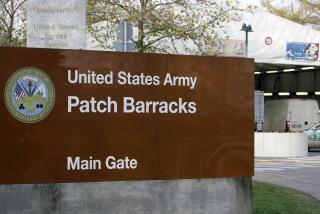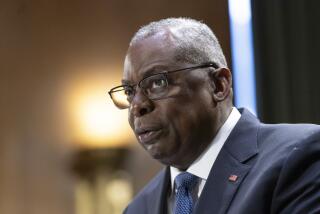U.S. Tightens Security at Compound
- Share via
DHAHRAN, Saudi Arabia — U.S. Air Force officials in Saudi Arabia adopted tighter security practices Thursday in response to what they see as a continuing terrorist threat.
Following Tuesday night’s deadly bombing, military experts met with Saudi counterparts to look at widening the security perimeter around the targeted American compound and to erect stronger barriers against possible attackers, an Air Force general said.
The 4404th Composite Air Wing, which lost 19 of its members in the explosion, also shifted troops out of living quarters that face the outside of the compound’s 40-building housing complex to shield them from another attack.
And it adopted security measures that, among other things, call for troops to refrain from saluting. The change is intended to prevent an enemy from identifying officers, whom they would presumably want to kill first, one officer said.
In Tuesday’s blast, a truck laden with explosives was parked 35 yards from living quarters filled with U.S. military personnel at an hour when most were preparing to go to bed.
At a news conference Thursday, Air Force Gen. Kurt Anderson, joint task force commander for the southwest Asia region, denied that there was a “miscalculation” in planning security.
“It was a bomb size that we didn’t expect,” he said, speaking 46 hours after the explosion.
Officers had relied on their knowledge of November’s bombing of a training facility in Riyadh, which killed seven people, including five U.S. military personnel, Anderson explained.
That bomb was calculated to have 250 pounds of explosive power. The bomb that tore through the military installation Tuesday was at least 10 times larger--more than 3,000 pounds, Anderson said.
After the Riyadh bombing, the base increased perimeter fencing and the number of concrete barriers in place around the complex. Extra security police were posted on roofs to watch the perimeter, said Brig. Gen. Terry Schwalier, the Air Force commander in Dhahran.
Anderson rejected suggestions that the size of other car and truck bombings in the Middle East--such as the 1983 attack at the U.S. Marine headquarters in Beirut--and the recent stream of vitriolic anti-U.S. statements from Islamic extremists in Saudi Arabia should have warned the planners to be on guard against an attack of a far greater magnitude. “We took the threat as we knew it,” he said.
Senior Airman Samuel Aponte, who is from the Cleveland area, said that he, for one, had felt vulnerable even before the blast.
“You didn’t have to be a genius” to see that the principal security threat to the complex was where the attack occurred, he said. “If anybody wanted to do anything, there’s the place.”
More to Read
Sign up for Essential California
The most important California stories and recommendations in your inbox every morning.
You may occasionally receive promotional content from the Los Angeles Times.














